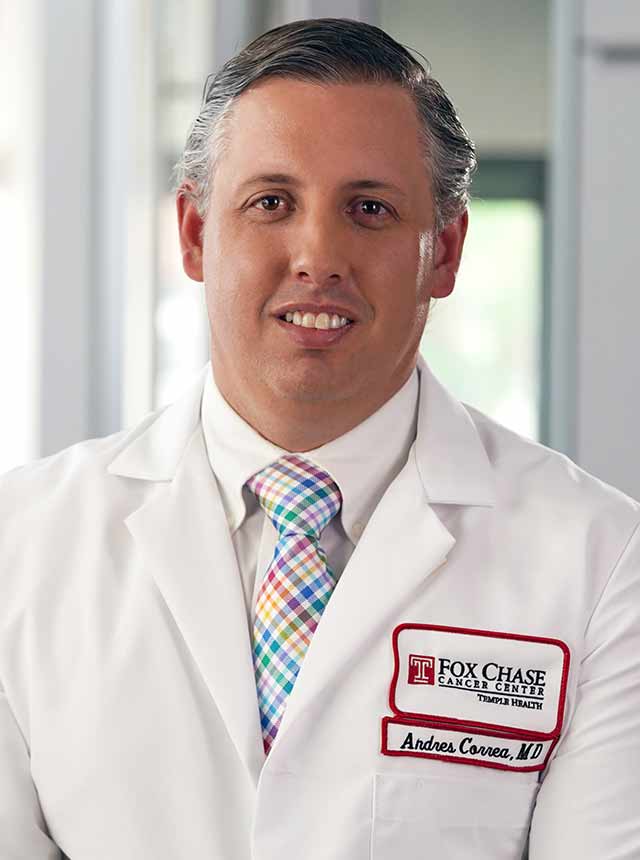

For some men with intermediate-risk prostate cancer, neither active surveillance nor traditional treatments are acceptable treatment options. Surveillance and no treatment may seem too risky, and yet proceeding with a surgery for prostate removal or receiving weeks of radiotherapy may seem extreme and too radical a treatment.
Researchers at Fox Chase Cancer Center recognize the challenge of this situation and aim to fill the gap in treatment options, and they have begun recruiting for a clinical trial called PRESERVE. The study is evaluating the safety and efficacy of the NanoKnife System to apply precise and limited treatment to only a defined region of the prostate. One endpoint of treatment effectiveness will be assessing the number of patients who are cancer-free one year following treatment.

Andres Correa, MD
Assistant Professor, Department of Urology
NanoKnife is being applied for prostate cancer focal therapy, which is a less invasive treatment approach without radiation therapy, that can eliminate cancer cells through different means, such as electricity, heat, and cold. Focal therapy has the goal of effective treatment of an isolated area of cancer while sparing normal cells and uninvolved regions of the prostate. A less intensive prostate cancer treatment could result in fewer treatment side effects.
“NanoKnife technology uses electricity to create a very high voltage between two probes. After the lesion is identified and biopsied, it is placed between the probes, with the electricity disrupting the integrity of the cancer cell membrane, and destroying the cancer,” says Correa.
“This technology is the future,” says Andres Correa, MD, an assistant professor in the Department of Urology and PI for the Fox Chase trial. “I’m hoping that in ten to fifteen years, surgically removing the prostate will occur only in a limited number of patients, since these surgeries can dramatically affect a patient’s quality of life and psychosocial well-being.”
PRESERVE, the Pivotal Study of the NanoKnife System for the Ablation of Prostate Tissue, is being conducted with several other sites in the United States—with Fox Chase as the only location offering this in Pennsylvania.
Fox Chase already applies two other options for focal therapy for treating prostate cancer in addition to the NanoKnife study. The first is cryoablation, where a needle probe freezes and kills diseased prostate tissue. The second is high-intensity focused ultrasound, using heat-generating sound waves to eradicate diseased tissue.

David Chen, MD, FACS
Professor, Department of Urology
For the new study, researchers nationwide are enrolling 118 men with intermediate-risk prostate cancer who will be treated with NanoKnife and have standard aftercare. They will be observed closely through prostate-specific antigen (PSA) testing, MRIs, and will finally repeat prostate biopsies through 12 months. Then they will be followed for five years to monitor whether cancer returns after treatment. Correa is the Fox Chase site director of the trial, with co-PI David Chen, MD, FACS, a professor in the Department of Urology.
Chen said that historically prostate cancer has been overtreated. Aggressive therapies like surgery or radiation were routinely recommended in all cases, and many men with intermediate levels of prostate cancer may not have benefited from this one-size-fits-all approach.
“This technology fills a role for men requiring some treatment, but for whom the more radical treatment is not needed,” said Chen.
With the PRESERVE trial, researchers hope to provide conclusive evidence that the NanoKnife System is suitable for these “in-between” patients, and it will help researchers and clinicians understand the optimal use of an innovative technology, in its effectiveness on cancer and impact on quality of life.
Read more about the trial here or to enquire about eligibility for your patients, please call 215-214-1515.


